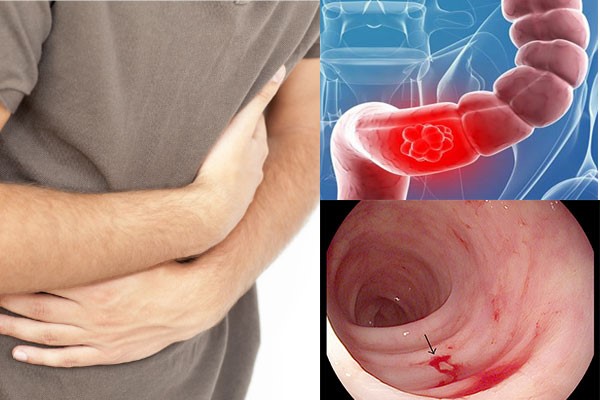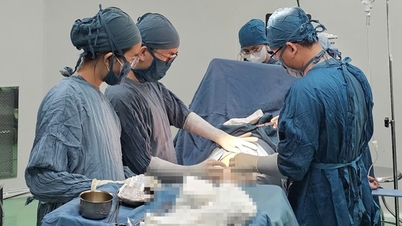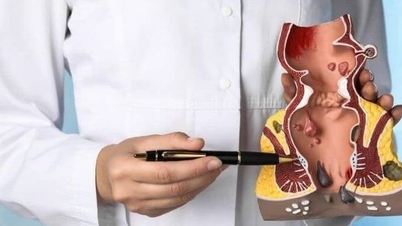Ulcerative colitis is a chronic inflammatory disease that can cause serious consequences such as anemia, exhaustion, intestinal perforation, etc., and can even be life-threatening if not diagnosed and treated promptly.
Causes of ulcerative colitis bleeding
The cause of ulcerative colitis bleeding has not been specifically studied. However, genetic and environmental factors are among the risk factors causing ulcerative colitis bleeding.
Genetics: About 10 – 25% of people with ulcerative colitis have a relative (sibling or parent) with inflammatory bowel disease (ulcerative colitis or Crohn's disease).
Due to the environment: Infections, unhealthy eating habits, lots of spicy foods, fried foods with lots of oil, stimulants, and alcoholic beverages can easily lead to damage to the colon.
Symptoms of ulcerative colitis bleeding
Symptoms of the disease may include:
- The patient has abdominal pain, which can be dull or intermittent, around the navel, along the colon.
- Bloating and discomfort.
- Bowel disorders, mainly loose stools, many times a day, loose stools may have blood and mucus or constipation, after the stool there is alternating blood and mucus or loose constipation; urge to strain, anal pain after defecation.
- May lose weight, have fever or anemia: pale skin, dizziness; body fatigue.
- There may be extra-digestive signs: painful swelling of the joints, uveitis, sclerosing cholangitis.

When having abdominal pain, it can be dull pain or pain in attacks, need to be alert for bleeding ulcerative colitis.
To make a definitive diagnosis, doctors will order tests such as: blood tests, stool tests, colon X-rays, and colonoscopy.
In which colonoscopy helps diagnose and assess the extent of colorectal damage; biopsy can be performed during colonoscopy to perform pathological anatomy to diagnose the cause and differentiate from other diseases.
Treatment of ulcerative colitis bleeding
The two main goals in the treatment of ulcerative colitis are to control symptoms and prevent recurrence. The treatment of ulcerative colitis depends on many factors, the most important of which is early detection and timely emergency treatment, specifically:
Medical treatment
Patients need to use medication as prescribed and directed by their doctor.
– Drugs commonly used to treat ulcerative colitis with bleeding: derivatives of 5-ASA (5-Aminosalicylic acid), Corticoids, immunosuppressants azathioprine, cyclosporin, in severe cases use biological drugs.
– Patients need to follow a nutritious diet, with enough energy, choosing soft, easily digestible foods. Avoid greasy foods, fried foods, raw vegetables, alcoholic beverages, and spicy foods.
Surgical treatment
Colectomy is the only method to completely cure the disease, often applied in severe cases causing toxic megacolon, risk of colon perforation, severe gastrointestinal bleeding, cancer or when the disease does not respond to medical treatment.
Some notes for patients with ulcerative colitis bleeding
Eating habits do not cause ulcerative colitis, but they can make the condition worse. A healthy eating habit will help limit flare-ups. Therefore, patients should note:
- Limit dairy products if you are intolerant to milk. If you do not have any problems after drinking milk, you should still drink it because it is a source of essential protein and calcium.
- Limit fatty foods: butter, margarine, cream sauce, fried foods.
- Limit fiber if it causes bad symptoms. Steam, bake, or stew vegetables.
- Do not use spicy foods, alcohol, or caffeine.
- Divide into many small meals instead of eating 2-3 meals per day.
- Drink plenty of water, preferably filtered water.
- Supplement vitamins and minerals.
In addition, avoid stress, although it does not cause ulcerative colitis bleeding, stress can make the symptoms worse. Therefore, you should also learn to accept and live with ulcerative colitis, without worrying or being depressed. Limit stress by exercising, yoga, meditating, walking, relaxing and breathing exercises.
Summary: Ulcerative colitis is a dangerous digestive disease that can cause complications such as perforation or colon dilation, gastrointestinal bleeding, and even cancer. Therefore, everyone should have a regular health check-up at least once a year to screen for diseases not only of the digestive tract but also of the entire body.
When there are signs of illness, typically bowel disorders, frequent abdominal pain, you should immediately go to a medical facility for examination and timely investigation of the cause of the illness, and have appropriate treatment.
Dr. Nguyen Xuan Ha
Source: https://giadinh.suckhoedoisong.vn/viem-loet-dai-truc-trang-chay-mau-co-chua-khoi-khong-172241101213508132.htm






![[Photo] Parade to celebrate the 50th anniversary of Laos' National Day](/_next/image?url=https%3A%2F%2Fvphoto.vietnam.vn%2Fthumb%2F1200x675%2Fvietnam%2Fresource%2FIMAGE%2F2025%2F12%2F02%2F1764691918289_ndo_br_0-jpg.webp&w=3840&q=75)





















![[Photo] Worshiping the Tuyet Son statue - a nearly 400-year-old treasure at Keo Pagoda](/_next/image?url=https%3A%2F%2Fvphoto.vietnam.vn%2Fthumb%2F1200x675%2Fvietnam%2Fresource%2FIMAGE%2F2025%2F12%2F02%2F1764679323086_ndo_br_tempimageomw0hi-4884-jpg.webp&w=3840&q=75)








































































Comment (0)